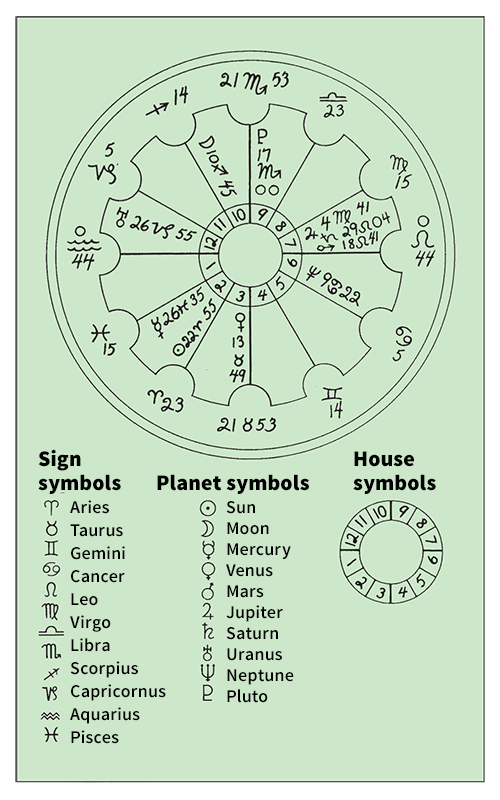Horoscope is a chart that supposedly reveals a person’s character or future. The chart shows the position of the earth, planets, and stars at a certain time, such as the time of a person’s birth. Astrologers (people who tell fortunes by studying the stars) believe that the position of these bodies influences a person’s life. An astrologer casts (draws) a person’s horoscope and explains its supposed meaning. Most scientists would say that there is no scientific basis for a belief in horoscopes. Yet, many people believe in horoscopes and base important decisions on advice they receive from astrologers. Others find it amusing just to read general advice published in newspaper “horoscope” columns.
Parts of a horoscope.
A horoscope has three main parts that represent three supposed influences on a person’s life. The three parts are (1) the zodiac, (2) the houses, and (3) the planets.
The zodiac
is a band of stars that appears to encircle the earth (see Zodiac ). The zodiac consists of 12 divisions called signs. Astrologers believe that a person comes under the special influence of a particular sign, depending on the date of the person’s birth. For example, a person born from July 23 to August 23 has Leo as a zodiac sign and is often called “a Leo.” Each zodiac sign has certain characteristics. For example, a Leo supposedly displays cheerfulness and pride.

The houses
represent imaginary divisions of the surface of the earth. Astrologers believe there are 12 houses, which are represented by 12 divisions of a person’s horoscope. Each house supposedly influences a certain part of a person’s life. The first house, for example, is associated with an individual’s appearance and personality. Other houses affect a person’s career, health, marriage, or some other interest.
The planets,
according to astrologers, include the moon and sun as well as Jupiter, Mars, Mercury, Neptune, Pluto, Saturn, Uranus, and Venus. The planets supposedly have an important influence on the houses and signs. A particular planet rules (most influences) each sign. This planet has certain characteristics that affect the sign it rules. For example, Mercury, which is associated with talkativeness and wittiness, rules Gemini. Therefore, people born under the sign of Gemini are supposedly talkative and witty.
Astrologers also believe that the planets influence the activities or interests associated with individual houses. For example, if Venus (associated with beauty) were located in the first house (associated with appearance), an astrologer would conclude that the person had an attractive appearance. The various planets in a person’s chart lie at particular angles to one another. These angles, called aspects, also have meaning. Astrologers believe certain angles represent signs of good fortune. Other angles supposedly reveal approaching evil.
Explaining a horoscope.
A horoscope enables an astrologer to develop several kinds of character readings. Some horoscopes, for example, give only a general idea of a person’s character or future. Most horoscopes published in newspapers are of this type. They make predictions based only on the characteristics of zodiac signs. Such a horoscope might tell people born under the sign of Taurus simply that they face an important test in their career. Astrologers may also cast a complete horoscope and study the complicated relationships formed by the houses, planets, and zodiac signs.
